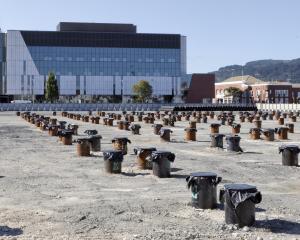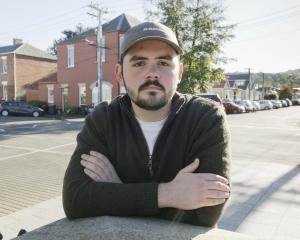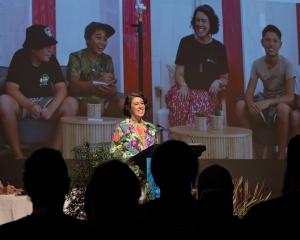Car crash, sudden death, burglary - these are the traumas New Zealanders can face on any given day.
Victim Support is there to ease the burden.
The organisation, which offers free, personal, confidential, 24-hour support for people affected by crime or trauma, started 25 years ago in Gisborne and in Dunedin soon after.
It came out of a police officer's recognition that the police force was not able to dedicate enough time or energy to looking after the needs of victims, and the bewilderment many victims felt through the court process.
There are 28 Victim Support volunteers in Dunedin, working on a 12-hour roster system to respond at times of crisis.
Southern practice manager David Charteris described it as a "needs-based" service, which offered practical assistance, advocacy and access to emergency grants.
"In the olden days, it was a cup of tea and comfort. Nowadays, it's a much more professional service.
"It's all about what's happening, what's the need and what are we going to do going forward," he said.
The organisation works closely with the New Zealand Police and is 80% funded by the Ministry of Justice.
For Mr Charteris, the quality of the service is directly related to the quality of its volunteers.
They come from all areas of the community and can work with victims for any period of time, from a few hours to a few years.
Volunteer Tania Ashton started with the organisation about four years ago.
"I have always done some type of volunteer work over my lifetime, and I had not done anything for ages and saw the ad' in the paper," she said.
The New Zealand Post operational support leader was not aware of the organisation before seeing the advertisement.
She had "never had any reason to have a need for that type of service".
However, the role was simple: "I help people in times of need when something horrible has happened.
"It can be anything from someone getting their wallet stolen to a sudden death."
When on call, the chance of her being contacted was "at the forefront of my mind", Ms Ashton said.
"I make sure I have my cellphone with me and I'm just ready and I hope like hell there is not going to be a callout."
Helping people in a time of need was "not a natural thing" for her, but she knew her work made a difference and showed people, even if they did not want her there, that someone did care.
"When you get a call, you feel 'What am I going to do'. You don't know what you are walking into - there is always that sense of anxiousness.
"For me, I always feel like I hope I will be able to make a difference. Even just being there, you know that you've done that.
"You introduce yourself and you take it from there. You can't really prepare yourself for what is going to happen.
"You just never know what they [the victims] are going to say, what they are going to need.
"Sometimes, you are just there in the room; sometimes, you don't have to say anything and other times you are more involved. You take their lead," she said.
The job varied from making a cup of tea, to calling people and organisations on victims' behalf.
"I never want to leave until I know that they have someone who is going to support them when I'm not there."
In the days following the initial contact, Mrs Ashton always followed up with the client, "to make sure there is nothing they need.
"You get really good moments where you've supported someone through something and you know you've made a huge difference and, if we did not have it, what would be there for those people?"
Jo Fielding started with Victim Support about 18 months ago, because she wanted to be there for others.
As deacon of St John's Roslyn Anglican Church and with a professional background in career guidance, she had spent "a lot of time working one-on-one with people", and enjoyed "reaching out and helping people".
"I want to be useful within the community," she said.
The role was "very difficult" and "sometimes demanding", but it was a "joy" to "walk alongside people when they need somebody next to them".
Depending on the client and the trauma they experienced, the work involved "giving straightforward information", such as what to expect during court proceedings or funeral options, helping people decide who they wanted around them at the time, or simply being with them.
"It's about being calm and being friendly so people can feel as confident as they can be in that situation ... and being someone they can say anything to.
A really important part of being a Victim Support worker is being comfortable being there with someone, even if a lot is not being said.
"It's difficult when you are there in a situation where you can't do anything obviously helpful ... knowing there is nothing you can do to change what's happened.
"The best bits are when you can come away feeling that you have actually been of some use, even if it has been just being that calm, reassuring person."
Victim Support police liaison officer Sergeant Matt Scoles said it took a "special person" to volunteer for the organisation, and that police could "simply not do our job" without their assistance.
"I can't think of a more worthy organisation in terms of the relationship they have with police. It's very, very much a partnership," he said.
While police dealt with the "front end" of offending, the volunteers were able to assist victims through the justice system process and beyond.
"The job they do is second to none. It's extremely effective.
"It's comforting, at some level, to know the referrals we are making to Victim Support are going to be dealt with appropriately."
The service would become even more important as the national policing policy changed to focus more on victims, Sgt Scoles said.
"We are changing our focus a little bit from focusing on offenders to focusing on victims, and if we can reduce victimisation we are obviously reducing crime."
At a glance
WHAT IT DOES
- Provides immediate support in a crisis.
- Advises you on your rights.
- Volunteers listen and talk.
- Refers you to counselling.
- Assists and supports you at court trials and hearings.
- Gives you help to access other specialist support services.
- Provides emergency grants and financial assistance to help you deal with, or recover from, your experience.
- Prepares victim impact statements and attends family group or restorative justice conferences.
HOW THE SYSTEM WORKS
- Police contact the national call centre or the regional office with a referral. Victims can also self-refer to regional officers, usually for advice or information.
- On-call volunteer contacted and dispatched.
- Volunteer talks to victim and assesses needs.
- Volunteer follows up with victim in the days and weeks after.
- Volunteer debriefed on case.
- Volunteers can support clients through the justice system, with everything from liaising between police, to preparing victim impact statements for court, and supporting them through parole hearings.
For more information, visit www.victimsupport.org.nz












